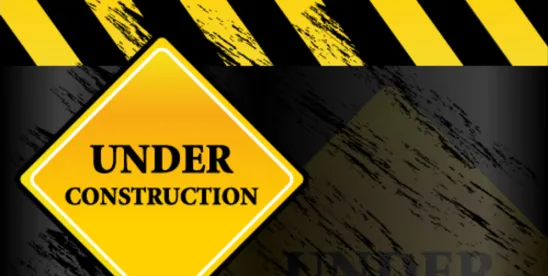The construction industry has long been a target for antitrust enforcement.
For construction company owners and managers, understanding antitrust laws and implementing effective compliance measures isn't just good business practice, it's essential protection against potentially devastating legal consequences.
Why Antitrust Matters in Construction
Antitrust laws are designed to protect consumers and the competitive marketplace from behaviors that restrict competition or trade. They apply to businesses of all sizes, including construction companies, and carry serious penalties for violations.
The construction industry faces particular scrutiny for several reasons. The project-based nature of the business creates numerous opportunities for competitors to interact on bids and contracts. The prevalence of subcontractor relationships often blurs the lines between competitors and partners. Local trade associations often bring competitors together, creating environments where improper discussions may occur. Additionally, the substantial dollar values involved in many construction projects naturally increase regulatory interest in ensuring fair and competitive practices.
Understanding the Legal Landscape
Antitrust laws operate at both federal and state levels and can create both civil and criminal liability. The core federal antitrust statutes include three primary laws that construction company managers should understand.
The Sherman Act serves as the foundational antitrust law, outlawing conduct that unreasonably restricts trade and criminalizing monopolization. It creates both civil and criminal liability for anti-competitive behaviors, making it particularly powerful in enforcement actions.
The Clayton Act, prohibits specific anti-competitive practices. These include price discrimination between customers when harmful to competition, "refusal to deal" arrangements, "tying" arrangements that stifle competition, and selling goods at unreasonably low prices specifically to destroy competition.
The Federal Trade Commission Act broadly bans "unfair methods of competition" and "unfair and deceptive acts or practices," providing a flexible tool for regulators to address emerging anti-competitive behaviors that might not fit clearly into other statutory frameworks.
While these laws might seem abstract, courts have translated them into very specific prohibitions that affect day-to-day decisions in construction management.
"Per Se" Violations: The Highest Risk Activities
Certain behaviors are considered so inherently anti-competitive that they are deemed "per se" violations—meaning they're automatically illegal regardless of their actual effect on competition. For construction companies, the most common per se violations fall into three categories: price fixing, market division, and bid rigging.
Price Fixing
Price fixing occurs when competitors agree to raise, fix, or maintain prices rather than allowing market forces to determine them. This doesn't require an explicit agreement to charge exactly the same price—almost any coordination on pricing elements can violate the law.
Common examples in construction include agreements among competitors to establish or adhere to certain price discounts, hold prices firm, adopt standard formulas for computing prices, or adhere to minimum fee schedules. Each of these practices undermines the competitive pricing that antitrust laws are designed to protect.
Several warning signs might indicate potential price fixing. These include identical prices among competitors, especially when they previously varied; simultaneous price increases not supported by increased costs; or elimination of discounts that were historically offered. Any of these patterns should prompt careful review of competitive practices.
Market Division
Market division schemes involve competitors agreeing to divide markets among themselves, whether by geographic area, customer type, or project category. For example, if two contractors whose footprints previously overlapped agree that one will only pursue projects in eastern North Carolina while the other focuses on the Piedmont region, that may be an illegal market division.
These agreements also can manifest in more subtle ways. Even bidding behaviors like consistently declining to bid in certain areas or for certain customers, or submitting intentionally high bids outside your "territory," can suggest market division. Both refusing to sell in certain markets and quoting intentionally high prices in those markets can raise suspicions of market allocation agreements.
Bid Rigging
Bid rigging is particularly relevant to construction companies and takes many forms. In bid suppression schemes, competitors agree that some will refrain from bidding or withdraw bids so that another can win. The winning bidder often rewards the others with subcontracts as compensation for not competing. With complementary bidding, competitors submit "cover bids" that are intentionally too high or contain special terms ensuring they won't be accepted, creating the illusion of competition while guaranteeing a predetermined winner. In bid rotation schemes, all competitors submit bids but take turns being the lowest bidder according to a predetermined pattern.
Each of these practices artificially inflates prices and undermines the competitive bidding process that public and private owners rely on to obtain fair market prices. Government enforcement agencies are particularly vigilant about bid rigging in public construction projects, where taxpayer funds are at stake.
High-Risk Situations: When to Be Especially Vigilant
Certain business situations potentially create higher antitrust risk and deserve special attention from construction company managers and owners.
- Interactions with Competitors
Direct communication with competitors presents the highest risk of antitrust violations. When interaction becomes necessary, construction managers should keep communications concise and strictly business-related. Any discussion of pricing, costs, or bidding strategies should be scrupulously avoided. It's important to remember that all written communications, including emails and text messages, are potentially discoverable in litigation. Never fall into the trap of justifying questionable practices because "everyone else is doing it"—this provides no legal protection and may actually make the violation appear more deliberate.
- Trade Association Meetings
Trade associations are typically the first place government investigators look when suspecting antitrust violations. While these organizations provide valuable industry benefits, they also create regular opportunities for competitors to interact. When participating in trade association activities, construction managers should avoid any discussions of prices, terms or conditions of sale, costs, future production, or marketing plans—even in informal settings like dinners or social events. Reviewing meeting agendas in advance can help identify potentially problematic discussion topics. If conversations venture into sensitive competitive areas, consider leaving the meeting to avoid even the appearance of participating in improper discussions. Having legal counsel review any information-sharing programs before participation can provide additional protection.
- Joint Ventures and Partnerships
Joint ventures between competitors can serve legitimate business purposes but require careful structuring to avoid antitrust issues. If you're considering a joint venture with a potential competitor, consulting legal counsel at the earliest possible stage can help ensure the arrangement is properly structured to achieve business objectives without creating antitrust exposure.
Communications About Pricing and Bidding
Any exchange of price information between competitors is dangerous under antitrust laws—even if the information is publicly available. This extends to all discussions about competitive bids, which are legally equivalent to discussions about prices and other sales terms. Even seemingly innocent sharing of pricing strategies or bidding approaches between competitors can create significant legal risk.
While you cannot discuss pricing with competitors, antitrust laws don't prohibit gathering market intelligence from non-competitor sources. Customers, vendors, and publications can provide legitimate market insights without creating legal exposure. These channels allow construction companies to understand market conditions without engaging in direct communications with competitors.
Practical Compliance Strategies for Construction Managers
To protect your company and yourself from antitrust liability, several practical strategies can be implemented:
- Developing a clear compliance policy is essential—this written document should clearly identify prohibited behaviors and provide guidance for high-risk situations. Regular review and updates ensure this policy remains current with changing enforcement priorities.
- Implementing regular training for all employees involved in pricing, bidding, or competitive decision-making ensures everyone understands not just what's prohibited but why these rules matter. These educational efforts should be documented and refreshed annually.
- Establishing standardized protocols for bid development emphasizes independent decision-making and creates documentation showing the legitimate business basis for bidding decisions. These procedures help demonstrate that pricing decisions reflect individual business judgment rather than collusion.
- Creating confidential channels for employees to report potential violations without fear of retaliation supports early internal detection of problems, allowing for corrective action before government involvement. This reporting system should include protections for whistleblowers and clear procedures for investigating concerns.
- Maintaining clear records that show the legitimate business justifications for pricing decisions, market strategies, and joint ventures with competitors provides valuable evidence if questions ever arise. These records should document the business rationale, market factors, and cost considerations that drove important competitive decisions.
- Implementing thorough due diligence procedures for activities like joint ventures and trade association participation helps identify and mitigate antitrust risks before they become problems. This assessment process should involve legal counsel when appropriate.
If You're Contacted by Investigators
If government investigators contact you about a potential antitrust matter, your initial response is critical. Always treat investigators professionally and courteously, but avoid answering substantive questions until speaking with legal counsel. Limit your responses to basic identification information regarding your employment, and politely explain that any document requests must be directed to company legal counsel.
Resources
For additional guidance, valuable resources include the Department of Justice's primer on "Price Fixing, Bid Rigging, and Market Allocation Schemes" and the FTC's Competition Guidance Documents, both available online.





 />i
/>i
